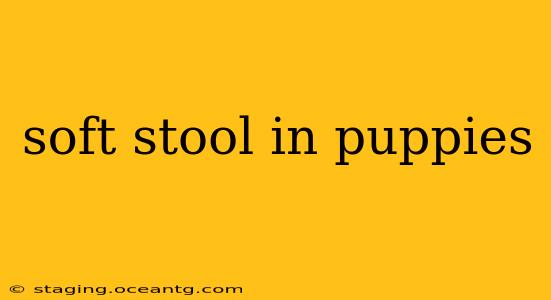Soft stool, or loose stools, in puppies is a common concern for new pet owners. While occasional soft stools aren't necessarily a cause for alarm, persistent loose or watery bowel movements can indicate a serious underlying health issue that requires immediate veterinary attention. This comprehensive guide will explore the various causes of soft stool in puppies, effective treatment options, and preventative measures to ensure your furry friend's digestive health.
What Causes Soft Stool in Puppies?
Several factors can contribute to soft stools in puppies. Understanding these causes is crucial for addressing the problem effectively.
Dietary Changes
A sudden change in diet, such as switching food brands or introducing new treats, can upset a puppy's sensitive digestive system, leading to loose stools. The introduction of new ingredients or a change in the food's fiber content can trigger digestive upset.
Food Allergies or Intolerances
Some puppies suffer from food allergies or intolerances to certain ingredients, like dairy, wheat, soy, or chicken. These allergies can manifest as soft stools, alongside other symptoms such as itching, vomiting, or diarrhea.
Parasites
Internal parasites, such as roundworms, hookworms, and coccidia, are common culprits behind soft stools in puppies. These parasites compete with the puppy for nutrients, leading to malabsorption and loose stools. Infections often present with other symptoms like lethargy, weight loss, and a pot-bellied appearance.
Bacterial or Viral Infections
Bacterial or viral infections, like parvovirus or coronavirus, can cause severe diarrhea and soft stools. These infections are often accompanied by vomiting, lethargy, and fever, and require immediate veterinary care.
Pancreatitis
Inflammation of the pancreas, known as pancreatitis, can affect digestion and lead to loose stools. Pancreatitis is a serious condition and requires prompt veterinary attention.
Stress or Anxiety
Environmental changes, separation anxiety, or other stressors can disrupt a puppy's digestive system and lead to soft stools.
Medications
Certain medications can have side effects that include digestive upset, resulting in soft stools.
How to Treat Soft Stool in Puppies
The treatment for soft stools in puppies depends entirely on the underlying cause.
Addressing Dietary Issues
If dietary changes are suspected, gradually transition your puppy to a new food over 7-10 days to minimize digestive upset. Consider high-quality puppy food formulated for sensitive stomachs. Removing potential allergens from the diet may also be necessary.
Parasite Treatment
If parasites are the cause, your veterinarian will prescribe appropriate deworming medication. Regular preventative deworming is crucial for puppies.
Managing Infections
Bacterial or viral infections require immediate veterinary care. Treatment typically involves supportive care, fluid therapy, and possibly antibiotics or antiviral medications.
Addressing Stress
Creating a calm and predictable environment for your puppy can help reduce stress and improve digestive health. Positive reinforcement training and consistent routines can help alleviate anxiety.
Veterinary Consultation
It's crucial to consult your veterinarian if your puppy's soft stools persist or are accompanied by other symptoms like vomiting, lethargy, fever, or blood in the stool. Your vet can perform a thorough examination, including fecal analysis, to determine the underlying cause and recommend appropriate treatment.
How to Prevent Soft Stool in Puppies
Preventing soft stools involves several strategies:
Consistent High-Quality Diet
Feeding a high-quality puppy food formulated to meet their nutritional needs is crucial. Avoid frequent changes in diet.
Regular Deworming
Regular deworming, as recommended by your veterinarian, helps prevent parasitic infections.
Stress Reduction
Providing a safe, stable, and stimulating environment for your puppy minimizes stress.
Hygiene
Practicing good hygiene, such as cleaning up after your puppy promptly, helps prevent the spread of parasites and bacteria.
Monitoring
Regularly monitoring your puppy's stool consistency allows for early detection of any changes. Any changes from normal should be reported to your veterinarian.
What if my puppy has diarrhea with soft stool?
Diarrhea, characterized by frequent, watery stools, is a more serious condition than simply soft stools. Diarrhea can lead to dehydration quickly, requiring immediate veterinary attention. If your puppy has diarrhea, contact your veterinarian immediately.
How long should I wait before worrying about my puppy’s soft stool?
While occasional soft stools are normal, if the condition persists for more than 24-48 hours, or is accompanied by other symptoms, it's essential to seek veterinary advice.
My puppy has soft stool and is vomiting. What should I do?
Vomiting and soft stools together are a significant cause for concern and indicate a possible serious illness. Contact your veterinarian immediately.
This information is for general knowledge and does not constitute veterinary advice. Always consult with a veterinarian for any concerns about your puppy's health. Early intervention is key to ensuring your puppy's digestive health and overall well-being.
